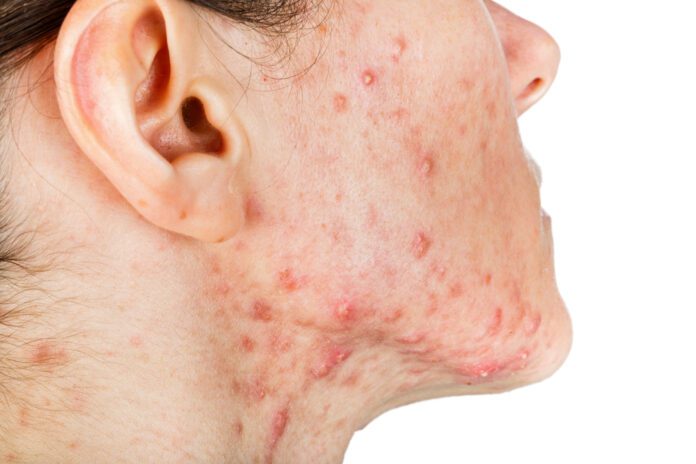Overview Of Acne
Acne is a chronic inflammatory skin condition. It is characterized by pimples and spots, especially on the face, neck, chest, upper arms, and back.
Acne comes in a variety of forms, including blackheads, pimples, whiteheads, cysts, and nodules.
Acne is most common during puberty, but can occur at any point in a person’s life. It cause is the activation of the sebaceous glands in the skin. This condition is not a dangerous or life-threatening disease, but it sometimes causes scars or permanent marks on a person’s skin when not treated properly or promptly enough.
Acne can be persistent, despite the availability of several effective treatments. The bumps, spots, and pimples usually heal slowly, and often new ones appear as soon as the old ones heal.
Commonly Associated With
Cystic acne, Zits, Acne vulgaris, and Pimples
Causes Of Acne
Doctors are not fully sure of the exact causes, but they believe that some factors may play a part, such as:
- Genetics
- Certain medications
- Fluctuating hormone levels
- Greasy makeup or other pore-blocking substances on the face
There are many myths about the possible causes of acne. Stress doesn’t cause it, and neither does diet in most cases – chocolate or greasy foods are not to blame.
However, for those who do have acne, some things can worsen their symptoms:
- Stress
- Scrubbing the skin too hard
- High humidity and pollution
- Picking at or popping existing pimples
- Pressure on the skin due to bike helmets, tight collars, or backpacks
Symptoms Of Acne
There is no specific cure for the condition. However, it is possible to manage it with proper treatment.
If over-the-counter (non-prescription) treatments have not worked over the course of several weeks, a health care provider can prescribe stronger medications if necessary.
A dermatologist can help the person:
- Avoid scarring or other forms of damage to their skin
- Control their acne
- Make their previous blemish scars less noticeable
Many often confuse acne with pimples, which are not the same thing. There is a simple explanation for the difference – Acne is the disease itself, and pimples are simply one of the symptoms. Acne vulgaris is also another name for acne.
Treatment For Acne
There is no simple “cure” for acne like a lot of other diseases and conditions. However, it can often possible to reliably control it with treatment. These treatments vary widely, and there are a great number of them. Some are available commercially and over-the-counter, and others need a prescription from a dermatologist to obtain. Make sure to contact a health care provider for advice as to what is the best course of treatment for the individual person.
Key Facts
- Risk factors for developing this condition include the menstrual cycle, genetics, stress or anxiety, hot or humid climates, popping pimples, and using oil-based makeup or other heavy substances on the skin.
- As an estimate, it affects 3 out of every 4 people aged 11-30 years old.
- Treatment depends on the severity and persistence of the blemishes
- Mainly involves the oil glands at the base of hair follicles
- This is not a dangerous health problem, but it can leave scars that cause emotional stress in some people
Forms Of Acne
Professionals use three levels to describe the severity of the condition:
- Mild – Medications and treatments used to treat mild cases are usually applied topically (to the outer surface of the skin).
- Moderate – Moderate cases are usually treated with oral antibiotics (given by mouth) as well as topical treatments.
- Severe – For the most severe cases of acne (antibiotics do not help) health care providers recommend oral isotretinoin as the best course of treatment. However, isotretinoin can have very serious side effects, so it is not prescribed lightly.



